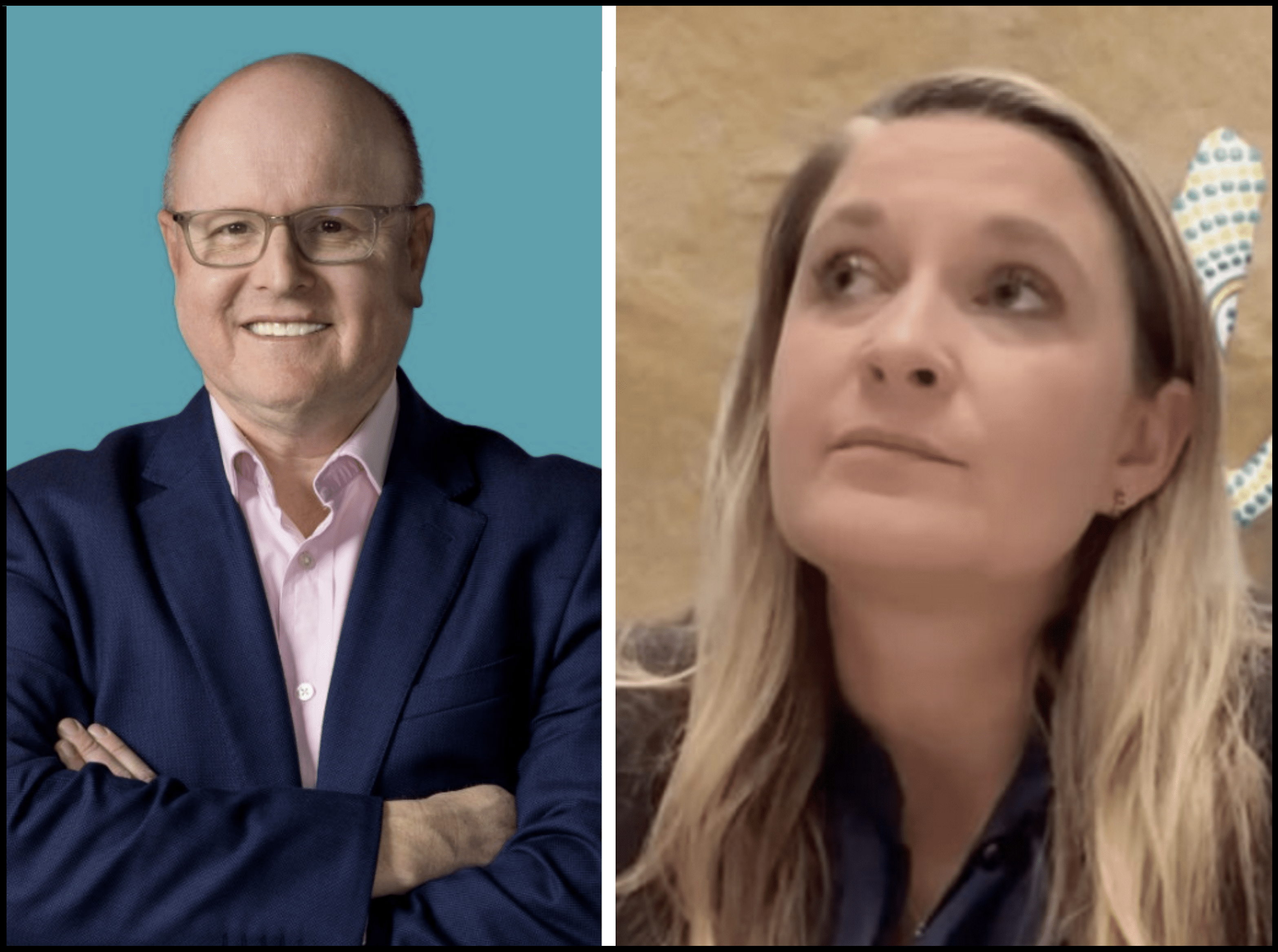-
Optus claims not “foreign donor”, provides no evidence
-
National security concerns, runs ADF satellite network
-
Same as “sophisticated attack” claims: zero evidence
EXCLUSIVE
Singaporean Government-owned telco giant Optus has claimed it is not a “foreign donor” under Australia’s electoral laws — but is refusing to provide any evidence to back the claim.
As revealed by The Klaxon, Optus made almost $70,000 in “donations” to Australian political parties last financial year, despite it being illegal for foreign donors to give $100 or more.
Under laws introduced in 2019 in a bid to curb foreign interference, a company is a “foreign donor” if it is more than 50 per cent owned by a foreign government.
A company is also a “foreign donor” if a foreign government is “in a position to exercise control over the company”.
Optus is both majority owned and controlled by the Singaporean Government.
It is 100 per cent owned by Singtel, which is 52 per cent owned by Singaporean Government investment arm Temasek.
“Optus is 100 per cent owned by Singtel, which is 52 per cent owned by Singapore Government’s Temasek”
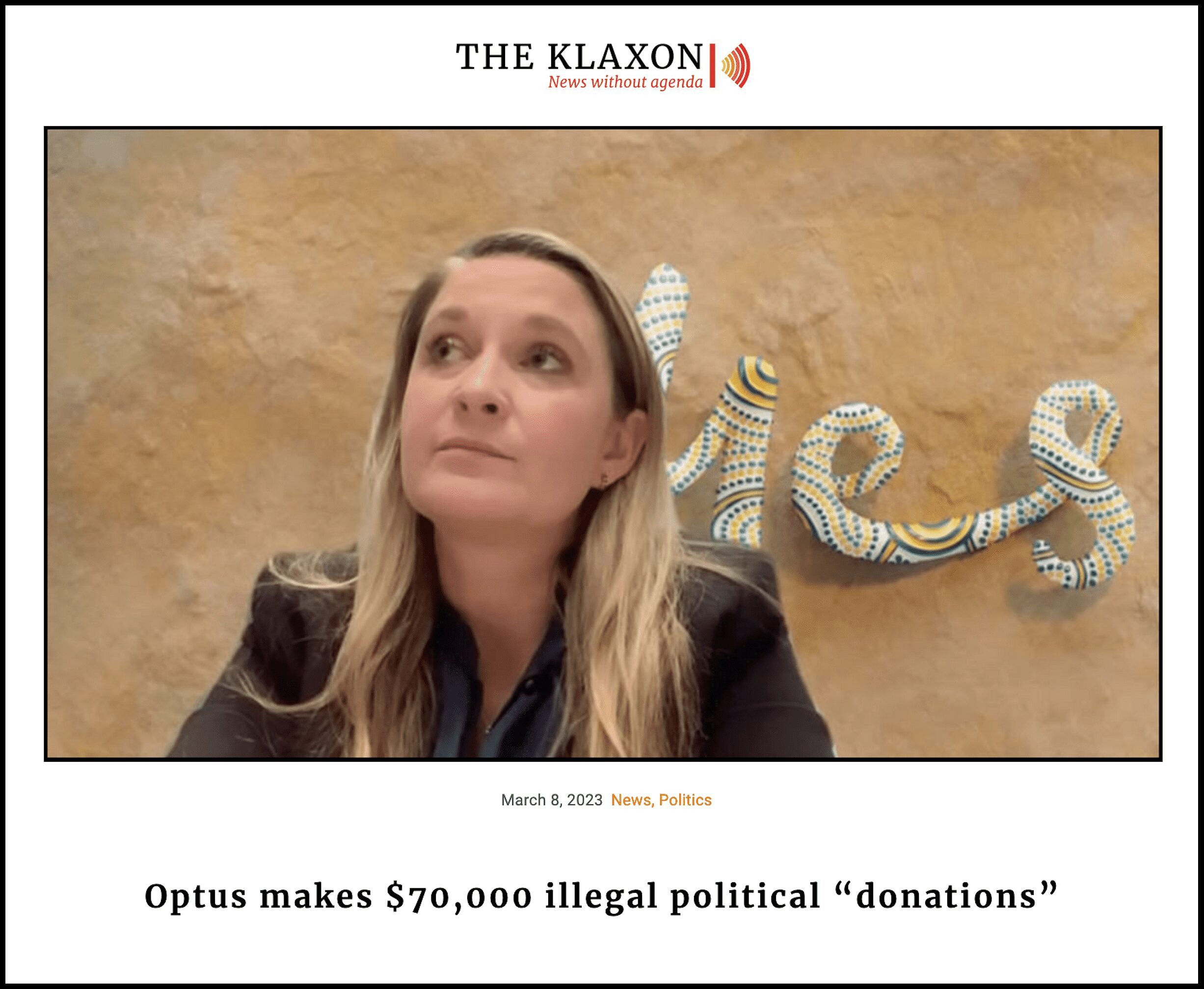
How The Klaxon broke the story on March 8. Bayer-Rosmarin pictured. Source: The Klaxon
After refusing to comment for a month, Optus management has claimed the company is not a “foreign donor”.
“Optus does not fall within the definition of a foreign donor under the Commonwealth Electoral Act 1918,” said Optus VP Regulatory and Public Affairs Andrew Sheridan.
Yet Sheridan, Optus and Singtel — including Singtel chair Lee Theng Kiat and Group CEO Yuen Kuan Moon — are all refusing to provide any evidence to back the claim.
Enjoying this article? Click here to support our important work
The secrecy around the political “donations” adds to ongoing serious concerns about Optus, which despite being owned by a foreign government provides key satellite infrastructure to the Australian Defence Force.
Australia’s security credentials are in the international spotlight after this month’s announcement it will acquire US nuclear-powered submarines as part of a three-decade, $368 billion program under AUKUS.
Some senior US politicians and intelligence experts have raised concerns Australia currently lacks the security to be trusted with the cutting-edge US technology.
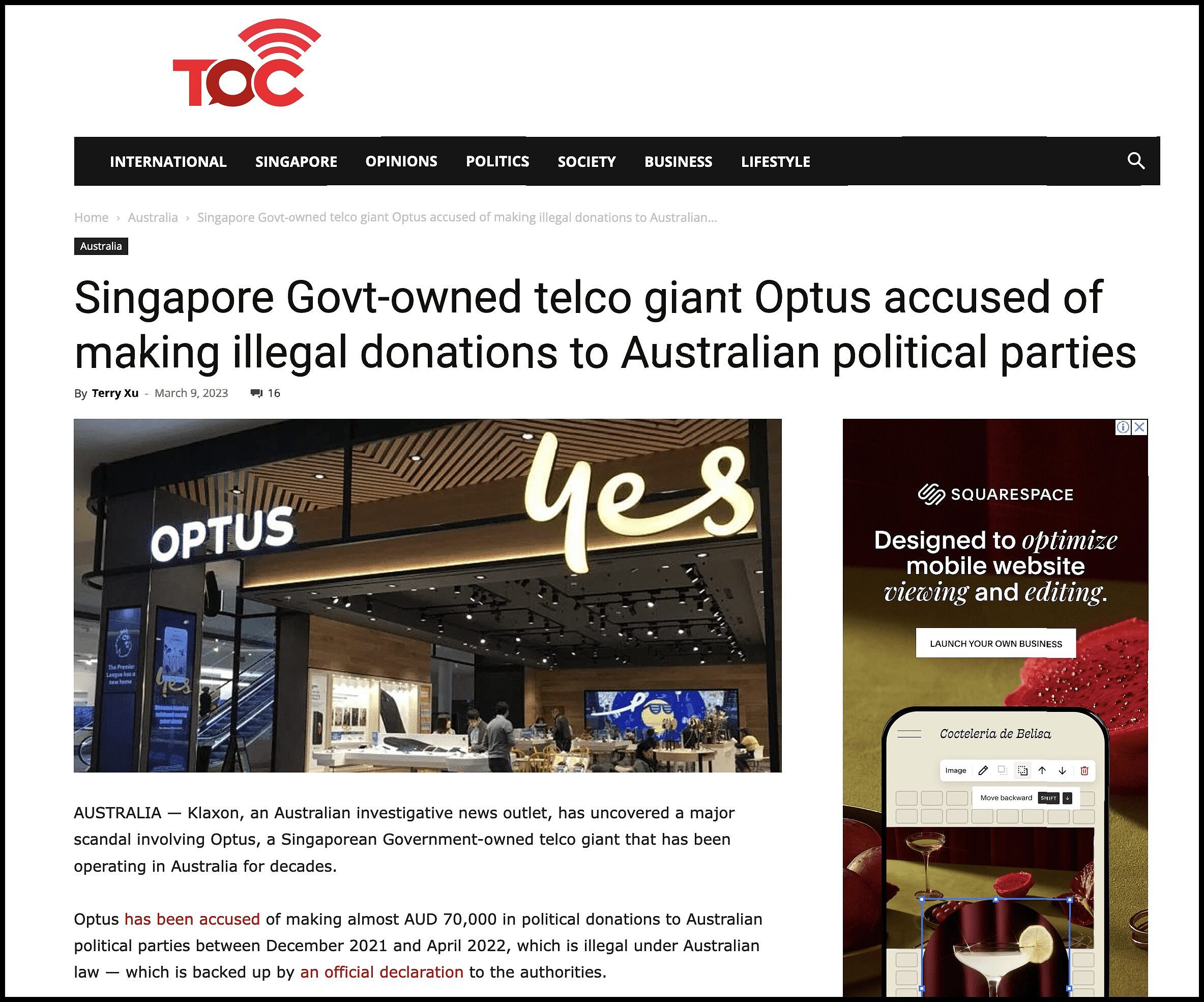
International coverage of The Klaxon’s expose. Source: The Online Citizen
In September it emerged Optus had been subject to the then biggest data breach in Australian history, with personal details of 9.8 million people — roughly every second Australian adult — released on the dark web.
Seven months later, Optus CEO Kelly Bayer-Rosmarin continues to claim it was a “sophisticated attack”.
That’s despite Australia’s intelligence and defence agencies; Cyber Security Minister Clare O’Neill; and many private sector experts, all stating it was a simple security breach and due to Optus’ negligence.
In a situation strikingly similar to Optus’ “foreign donor” position, Bayer-Rosmarin has provided zero evidence to back her claim.
(The only person to publicly claim it was a “sophisticated attack” is Bayer-Rosmarin herself.)
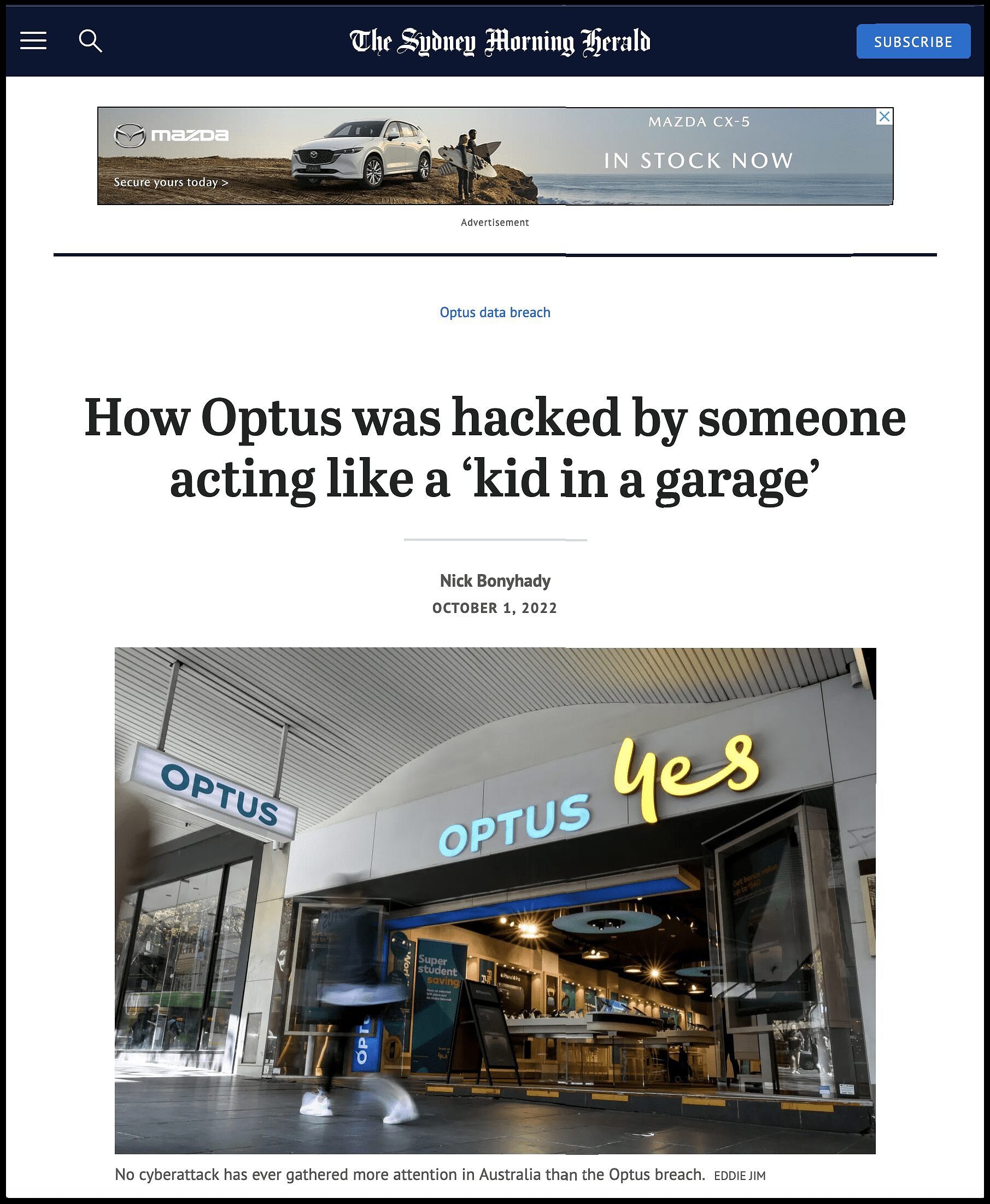
Rejected across the board: Optus CEO Bayer-Rosmarin’s ongoing claims of “sophisticated attack“. Source: SMH
National Security
Intelligence and defence experts have long held serious concerns over Optus providing key Australian Defence Force communications services, including via the Optus C1 Satellite.
“The Singaporean ownership structure of Optus has never been uncontroversial in national security circles”, writes public service publication The Mandarin.
“(That’s) chiefly because of the uncomfortable situation of a foreign government outside the Five Eyes signals intelligence club owning a supposedly sovereign domestic military communications asset”.
A Department of Defence spokesperson told The Klaxon Optus began providing satellite communications services to the ADF in 1992, when Optus acquired AUSSAT.
“Defence has primarily engaged Optus (Optus Satellite) as a satellite communications provider through a number of contracts between 2003–2034, valued at approximately $600m in total,” the spokesperson said.
“Of note, 2003 was the year of launch for the Optus C1 satellite and the hosted Defence communications payload that is still supported by that spacecraft”.
Following the Optus mass data breach, The Mandarin wrote there had been an “overt loss of government faith” in the company, with “political trust spiralling to a new low”.
“There is also a strong precedent for Defence shredding contracts over information security breaches and disclosure failures,” the publication writes.
“There is a strong precedent for Defence shredding contracts over information security breaches and disclosure failures” – The Mandarin
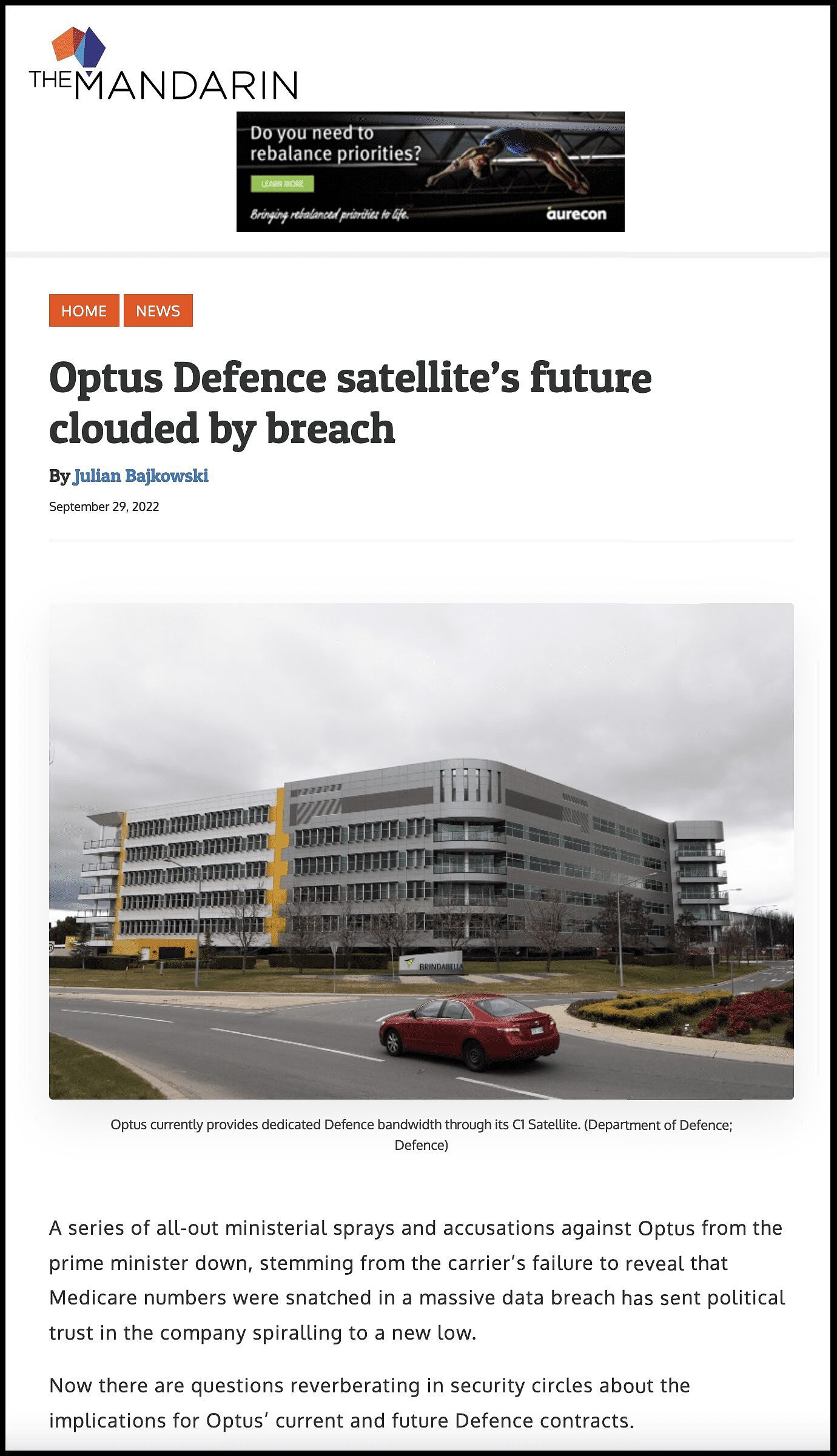
Australian Government trust in Singapore’s Optus “spiraling to new low“. Source The Mandarin
Offshore Campaign
On February 2 the Australian Electoral Commission (AEC) released its annual “data dump” of political donations disclosures.
Among them was a disclosure from Optus — signed by Sheridan — stating it had “donated” $69,900 last financial year, comprised of $41,400 to the Liberal and National parties and $28,500 to the ALP.
On February 10 The Klaxon approached Optus asking if it considered itself to be a “foreign donor” under Australia’s electoral laws — and if not, why not.
Optus, including Bayer-Rosmarin, refused to provide any response.
Subsequent approaches were similarly rejected over the next four weeks.
On March 8 The Klaxon ran the expose.
On March 12 an article appeared in Singapore’s The Straits Times, with claims from Optus that it was a not a “foreign donor”.
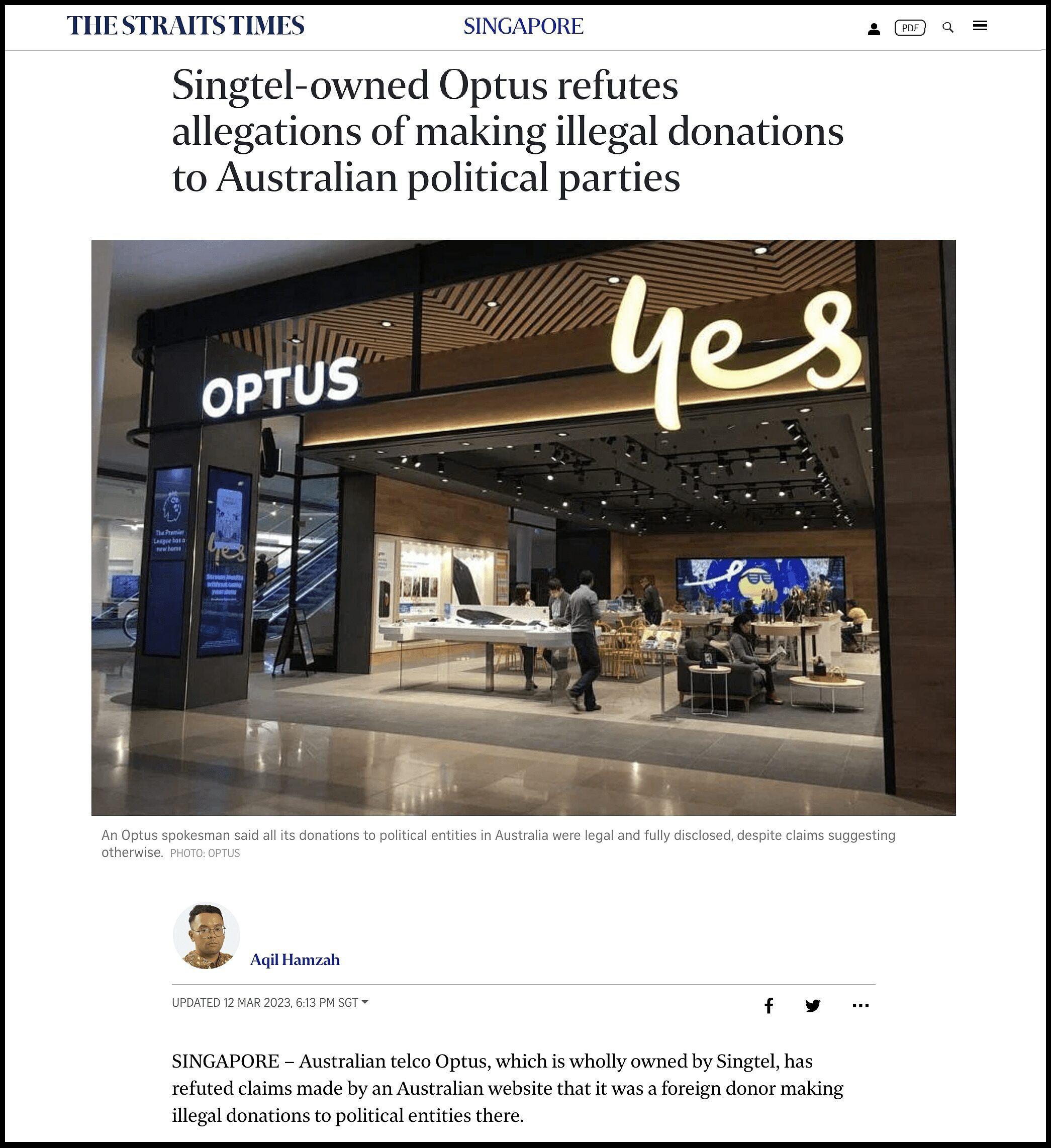
The Straits Times article containing Optus’ unsubstantiated claims. Source: The Straits Times
The article contains no evidence to back the claim, and quotes only an “Optus spokesman”.
“A spokesman for Optus said it ‘strongly refutes the false online allegations made around the legality of our political donations’,” the paper reports.
“The article provides no evidence to back the Optus claims”
The article continues: “Entities that are either incorporated or have their head office, or principal place of activity, in Australia are not considered foreign donors – criteria that Optus fulfilled”.
This is false.
As previously reported in detail, that fact that a company is incorporated in Australia, has its “head office”, or “principal place of activity”, in Australia, does not mean it is not a “foreign donor”.
On March 14 — after The Klaxon again approached Optus — we were provided with the statement from Sheridan that “Optus does not fall within the definition of a foreign donor”.
We have subsequently gone back to Sheridan, Bayer-Rosmarin, Optus and Singtel but are all refusing to provide any evidence to back the claim.
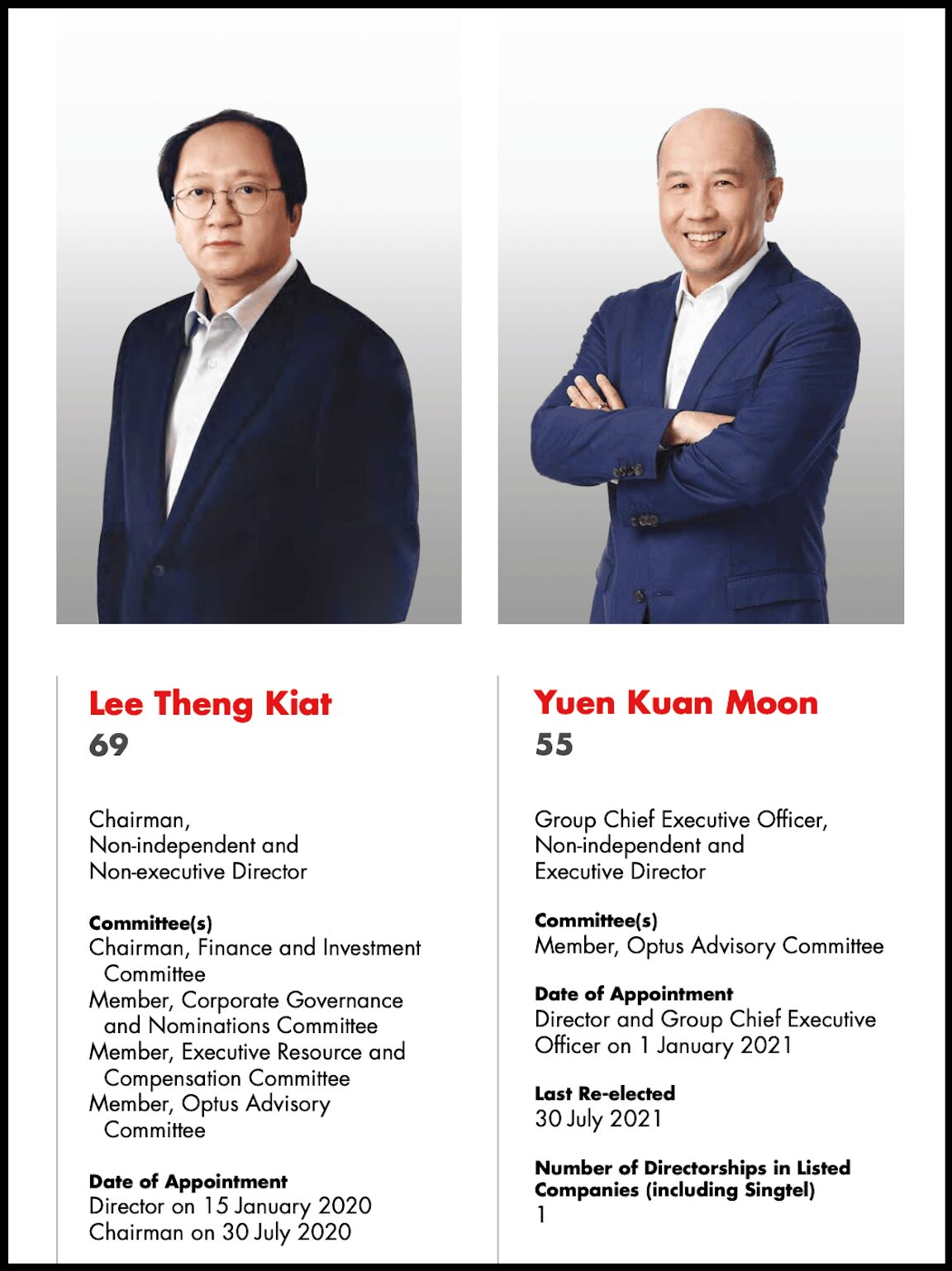
Refusing to comment: Singtel chair Lee Theng Kiat and Group CEO Yuen Kuan Moon. Source: Singtel
Australia’s foreign donor laws expressly state that a company is a foreign donor if it is a “foreign public enterprise”.
A company is determined to be a “foreign public enterprise” if it meets any one of five criteria — including if it’s over 50 per cent owned by a foreign government, or if a foreign government “is in a position” to “exercise control” over it.
The Klaxon asked Singtel/Optus whether it disputes that Optus is over 50 per cent owned by a foreign government.
We also asked whether the group disputes that Optus is “in a position to be influenced by a foreign government”.
We received no response.
WE HAVE A SMALL FAVOUR TO ASK! Only around 1% of our readers currently contribute. Please help us stay afloat and telling these stories you just won’t see anywhere else. Please SUBSCRIBE or CLICK HERE to make a one-off donation. Thank you!
Anthony Klan
Editor, The Klaxon
Help us get the truth out from as little as $10/month.
Unleash the excitement of playing your favorite casino games from the comfort of your own home or on the go. With real money online casinos in South Africa, the possibilities are endless. Whether you’re into classic slots, progressive jackpots, or live dealer games, you’ll find it all at your fingertips. Join the millions of players enjoying the thrill of real money gambling and see if today is your lucky day!
The need for fearless, independent media has never been greater. Journalism is on its knees – and the media landscape is riddled with vested interests. Please consider subscribing for as little as $10 a month to help us keep holding the powerful to account.


